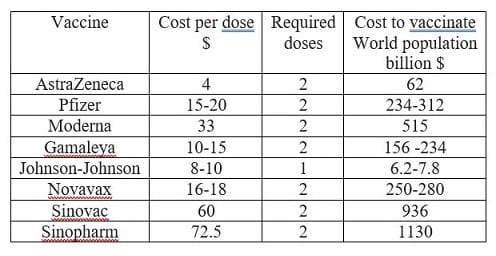The latter comparison, however, does not tell the full story. In Latin America, there are major differences, albeit less marked than in Africa. Twenty-one Latin American and Caribbean countries have vaccinated one-twentieth as many as Brazil, Mexico, Argentina, and Chile. It is true that some of those countries, especially those in the Caribbean, have small populations, but this does not apply to countries like Colombia, Ecuador, or Peru. However, it seems pertinent to note that 3 of the countries with the largest numbers of vaccines are precisely those where there is a domestic production of vaccines, while the fourth benefited from the immediate reaction of its government to the pandemic and from actually receiving many of the doses purchased.
We conclude that a policy of suspension of IPRs is necessary and right. But what about understandable rights, the producers may claim.
It may be worth estimating the commercial value of a COVID-19 vaccine and comparing it with the cost of the pandemic. We already mentioned the estimate of the ICC study. Other studies give larger estimates, but all of them are in the order of 10-15 trillion dollars.
Let us assume that a producer is able to produce and sell the vaccine needed to vaccinate the whole world population. We shall refer to the costs announced by each producer, even if not all the vaccines listed have been approved by the FDA or the European authority, to those quoted in the ICC study and to data available in the web. It is to be underscored that for our use of these data, their precision is not necessary.

These costs provide a rough indication of the maximum value of the know-how of each vaccine. Obviously, there are other variables to take into account, for example, the possibility that the technology of a vaccine be used for future pandemics could increase its value, whereas others, like the consideration of the financial support received, the fact that the indicated values are not a gain, the reduction of operating costs for transportation and storage, would reduce the expected gain.
These are details. In any case one point is clear. The cost of the pandemic is definitely much larger than the gain that pharmaceutical companies producing COVID-19 vaccine may expect, even under the unrealistic assumption of a world vaccination that uses only their vaccine.
Even in a free market logic, without using the rights the States have, it is not unconceivable to do at the level of international organizations what has been impossible to do in the Dominican Republic, and if once more the proposal of suspension of patents had failed, to find a satisfactory agreement which takes into account the different interests.
This is compatible with the proposal of the UN Secretary General of a Global Plan of Vaccination, with a production carried out by all the laboratories and firms that have a capacity to do that. If an agreement of this sort has been possible between competitors, as is the case with Merck and Johnson and Johnson, it should also be possible under the umbrella of the UN system.
These are mere economic considerations. Considering the toll in human lives there are the ethical reasons for making vaccines accessible to everybody along with the declarations of country leaders and the representatives of the pharmaceutical firms. We would dare to say that it is not a dream.
Behrouz Pirouz contributed to this article.
#rebuildingtravel






















